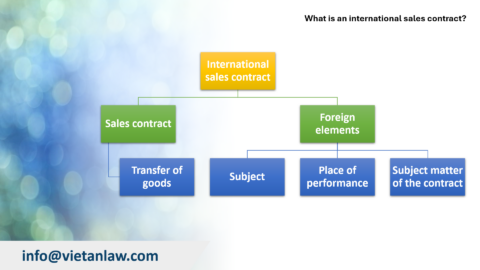In labor relations, entering into a contract is an important legal basis for determining the rights and obligations of the parties. Especially for employees, labor contracts are an important legal basis to protect them in labor disputes that may arise. To minimize risks when drafting and implementing this contract, Viet An Law provides advice on common errors in labor contract conclusion in the following article for your reference.

The labor contract is concluded directly between the employee and the employer.
However, in reality, that is not entirely the case. According to the law, employers can authorize others to enter into labor contracts to recruit employees. However, individual employers must directly enter into labor contracts and cannot delegate authority to others (Labor Code 2019).
It is mainly the employee who directly contracts because participating in a labor contract has personal status. But a certain group of employees can also authorize another employee (same group) to enter into a labor contract. However, the authorization of a group of employees for an employee to enter into a labor contract only applies to labor contracts with a fixed term. In that case, there must be a legal authorization document according to the provisions of the law.
Employees from 15 years old to under 18 years old can still enter into labor contracts on their own, but must have the written consent of that person’s legal representative for it to be valid.
Labor contracts take effect at different times depending on the will and behavior of the parties.
After signing, the process of maintaining the labor relationship is carried out first through the implementation of the labor contract.
In principle, a labor contract must be implemented by both parties. The parties are obliged to comply with their commitments. Employers have an obligation to ensure working conditions so that employees can fulfill their labor obligations. Work under a labor contract must be performed by the employee who has entered into the contract. The working location is implemented according to the labor contract unless the two parties agree otherwise (Article 28 of the Labor Code 2019). Rights under the labor contract must be fully respected and enforced.
However, according to the provisions of the Labor Code, in case of unexpected difficulties (due to overcoming the consequences of natural disasters, fires, epidemics; applying measures to prevent and overcome labor accidents, occupational diseases; electricity and water incidents…) or due to production and business needs, the employer has the right to temporarily transfer employees to other jobs outside their profession, but not for more than sixty (60) days in sum per year. When temporarily transferring an employee to another job, the employer must notify the employee at least three (03) days in advance, must clearly state the temporary employment period, and arrange work appropriate to his or her health and gender of employees. Employees who temporarily do other jobs are paid according to the new job. If the new job’s salary is lower than the old salary, the old salary will remain the same for 30 working days. The salary for the new job must be at least 85% of the old salary but must not be lower than the minimum salary prescribed by the State (Clause 3, Article 29 of the Labor Code 2019).
The above regulation is considered a “legal exception” to the implementation of labor contracts. Because it is against the principle of correct implementation. However, because this is a regulation of the Labor Code, employees are responsible for complying with the law and the unilateral decision of the employer.
In case of transfer and the employee does not comply, the employer has the right to discipline the employee, because it is considered a violation of labor discipline.
However, if the prescribed time is exceeded (i.e. exceeds 60 days according to the Labor Code), the employer no longer has this unilateral right. If the employer intentionally transfers the employee, the employee has the right to disobey. The employee has the right not to perform the work that the employer assigns him to do and still has the right to receive severance pay and consider it as a cessation of work due to no fault of his own.
In case of transfer beyond the prescribed time, to ensure legality, the two parties must reach an agreement on temporary or permanent transfer according to the principle of “changing labor contract”.
Changing the labor contract is when the parties mutually agree to change one or more contents of the valid labor contract. In principle, changing a labor contract does not accept a unilateral decision by one party but must be by consensus to be valid.
Suspension of performance of a labor contract is the cessation of performance of a labor contract for a certain period of time in cases prescribed by law.
Suspension of the labor contract creates the following legal consequences:
Firstly, even though the labor contract stops being enforced, the legal value of the labor contract remains the same. Rights and obligations in the labor contract are considered “frozen” and “preserved”;
Secondly, because the employee does not work, he or she does not receive a salary. Paying salaries to detained or detained employees is the intention of the state (although this should only be considered a guarantee and not a salary in its own right).
Thirdly, the suspension does not eliminate the remaining time of the determined labor contract if it is a definite-term labor contract. For example: Nguyen Van K signed a 3-year labor contract to work for Company P. After working for one year, Nguyen Van K was called up for 18 months of military service. When Nguyen Van K temporarily postpones the labor contract to do military service, the time from military enlistment to discharge is not deducted from the period of the labor contract.
Fourthly, even though the employee does not perform his or her labor obligations, the employer still has the right to take action against the employee who commits violations, including dismissal.
Fifthly, within 15 days from the end of the temporary suspension of the labor contract, the employee must be present to continue performing the labor contract. In case the employee does not arrive at the right time to start work, he/she may be subject to labor discipline, unless there is a legitimate reason. If you are absent without a valid reason, accumulating 5 days or more in a month, 20 days or more in a year, you may be dismissed.
Sixthly, in case the employee returns to work on time, the employer “must accept the employee back to work” (Article 31 of the Labor Code).
Seventhly, in cases where employees are temporarily detained or detained, the following rules must be followed:
The law does not stipulate how to automatically terminate a labor contract. But according to general understanding, a labor contract is considered to automatically terminate when one of the following cases occurs:
Termination cases clearly show that there is no intervention of any entity with respect to such termination. Objective events occur that cause the labor contract to automatically end.
The parties have the right to mutually agree to terminate a valid labor contract as long as the will to terminate is an expression of voluntariness and agreement between the parties.
The agreement to terminate the labor contract may occur before or during the process of maintaining the labor contract relationship.
That is the case where the two parties agree on one or more conditions that both parties set as the basis for future termination. For example: In the labor contract signed between Tran Van K and TN company, it is written: “Employees have the obligation to comply with the commitments in this labor contract. In case the employee acts disrespectfully towards the direct leader 2 times or more, this labor contract will terminate immediately after the employer notifies the termination of the labor contract. This notice shall not be construed as prior notice under the provisions of law.”
During the implementation of the labor contract, if either or both parties do not want to continue maintaining the labor relationship, they can mutually agree to terminate the labor contract. Termination takes place while the labor contract is still legally valid. Neither party may be at fault in terminating that labor contract.
In general, cases of termination due to agreement ensure legal elements, unless the agreement violates the law.
Illegal termination of a labor contract is the termination of a labor contract that does not comply with the provisions of law or can be determined to be illegal. However, determining cases of illegal termination of labor contracts from the employee’s side is not entirely the same as cases of illegal termination of labor contracts from the employer’s side.
The article is Viet An Law’s advice on common errors in labor contract conclusion. If you need advice or support in drafting labor contracts, please contact Viet An Law for the most effective support.




